Sometimes life can get in the way of one’s dreams. But all to often it is fear that prevents us from doing the things we really want to do. Sometimes, in order to find ourselves, we have to test ourselves. In this inspirational story, Margot Russell tells how hiking the Inca trail to Machu Picchu provided her with new-found self-confidence and inner strength…
[mc4wp_form]
The Land of Never: Hiking the Inca Trail by Margot Russell
I paused for a moment to catch my breath and readjust my gear. We had already climbed several hundred feet up the mountain, and I was ill from the altitude. I had fallen behind my group by stopping to rest, fighting off the shortness of breath and fatigue.
Below me, the gentle Urubamba River curved gracefully along the valley in the Andes Mountains of Peru. It had been just three hours since jumping off the rustic train from Cuzco with the others, literally in the middle of nowhere, to begin our hike along the ancient Inca Trail to Machu Picchu. Now, I was several thousand feet up the mountain and had miles to go before we stopped for the night. I was battling fatigue, altitude sickness and my own uncertainty that I would make it to the top.
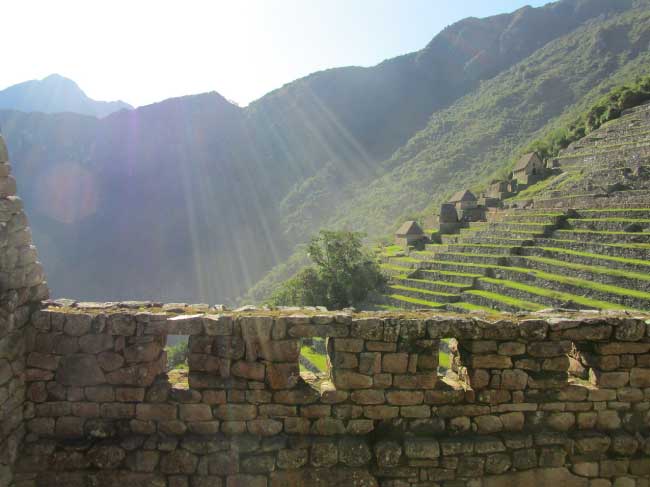
For almost half my life, I had wanted to travel to Machu Picchu. I think I stumbled upon a picture of it in my younger years, and it became an icon of what the endless world had to offer. It seemed a place of mystery and hidden adventure, a place that ordinary travel could not take you.
Missed Opportunity
Years before I finally got there, my Machu Picchu dream resurfaced when my father was traveling around the world and asked me to meet him there. It was an idea whose time had not yet come. I was the mother of three little girls, and travel was in the file marked “extravagant.”
When my father returned from his adventure two years later—freshly tanned, knapsack full of maps and trinkets, I began to see travel as an ordinary membrane that I could pass through. He had often lived in a tent and eaten by the campfire with other adventurers who were just hoping to see a different sky, forsaking fancy hotels and expensive restaurants in lieu of the road less traveled.
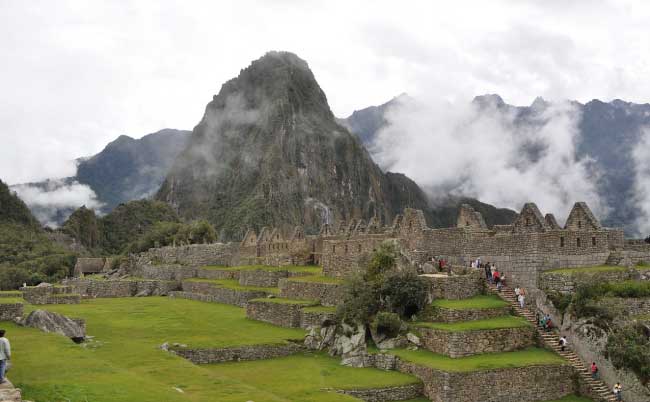
What truly stands between people and travel, I realized, are barriers of their own construct. We imagine it to be more expensive, more laborious, and more extravagant than it has to be. Here is the simple truth: If you want to go, then go.
When I went to Machu Picchu I had never traveled before. I was divorced and struggling to provide a life for my children. And I was a madwoman, running to my job and then running to daycare. I would grab my children by the scruff of their necks and plunk them down in the kitchen, where yesterday’s dishes and last month’s bills crowded our thoughts and the countertops.
And then I was diagnosed with a neurological disease and rather than allowing it to become a barrier, I used it as an excuse to get out of Dodge. When will I see the world, if not now?
I really had no business being on the Inca Trail, and my group’s guide seemed troubled by my lack of stamina.
When we paused at a thatched hut for a rest, there was a moment of clear indecision as I wondered if I’d make it the rest of the way. I had traveled a long way to be there, had evaded every single-mother obstacle, had found money to travel in an empty pot.
An hour later as I forged ahead, it was as if the dark cloud that had followed me had gently floated away. My breathing slowed, the dizziness disappeared and I told myself I could make it the rest of the way.
I had left my job as a reporter shortly after my diagnosis, and spent the next six months staring out of the picture window in the kitchen. I couldn’t appreciate the silence in my life because it felt like emptiness. It was the only time that I can remember in my life when I wasn’t striving for control.
I view that period of my life now as a great slowing of the engines. Racing down the track full steam, the view had always been obscured by my headlong flight; the point of convergence was always up ahead. It was a time of silent, indulgent sobriety, but it served to refocus my view. I was back to kitchen work: reorganizing the pots and pans scrubbing the floors and the walls of a tired soul. I had to begin again, a most long and painstaking task.
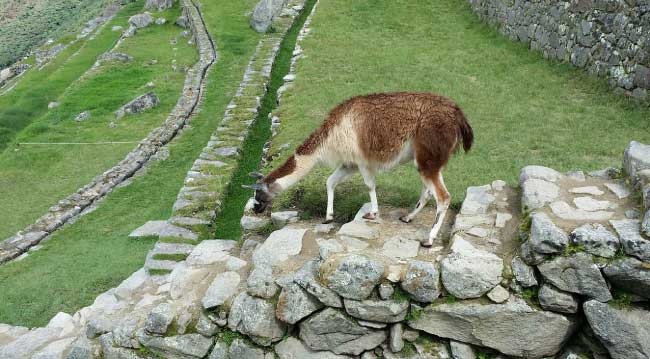
As I made my way, planting seeds in an empty garden, I revisited old dreams for a time and decided I would travel. I wanted to trek to a place of ancient origin, where clarity was bequeathed from the mountaintops, and where the motion of my feet would bring me to a better view.
We arrived at sunset to a large complex high up in the Andes that housed hundreds of hikers on their way to the mysterious land of Machu Picchu. The rest of my group went to explore the area where our tents were set up, but I dropped onto a stone terrace, barely able to move. I had never been so tired or dirty in life. I sat alone for hours, thinking of my family, and wondering why I had dragged myself to the top of the world like this.
Thoughts of the day drifted through my mind—-the 200-foot waterfall we had passed in the morning, and the river in the rainforest where we’d stopped to eat our lunch. We had hiked passed ancient ruins left unscathed by time and it occurred to me that I was creating my own history—in charge of the way I lived my life.
At dinner, made by our porters late in the evening, I declined all but the soup. I was physically and mentally exhausted, but I reveled in my new persona: explorer, wanderer, dirty mother high up in the mountains donning dusty hiking boots.
After a cup of tea made from coca leaves and boiling water, we climbed a mile farther up the mountain to our tents. I was the only single person in my group, so I had a tent to myself, pitched right next door to a small shack inhabited by a Quechua Indian woman. The Quechuas, descendants of the Incas, still live a very primitive life farming in the mountains of the Andes.
Machu Picchu
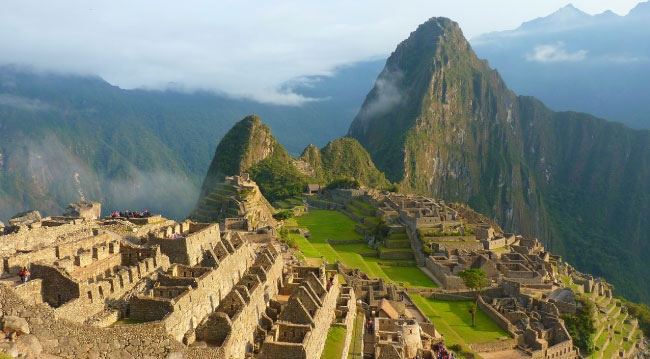
Built sometime around 1400 A.D., Machu Picchu was presumably a spiritual center for the Incas, who inhabited a large section of South America a thousand years after the death of Christ. They were master builders and mason, incredible engineers and stout environmentalists. They sought to harmonize the work of humans with the work of nature. They worshipped the water, the land, and the sun, as they did their gods, and they built temples of thanks in places of incredible beauty. Machu Picchu had been built high up in the mountains, at over eight thousand feet—a difficult place to reach. The Spanish never discovered it, even after they had conquered the Incas.
We had planned to awaken for breakfast at 3:00 in the morning, and then begin the final leg to Machu Picchu. I lay there, alone in my tent, taking stock of my physical condition. My legs ached and I was short of breath, yet I felt so alive.
I tried to sleep, but a rooster, two donkeys and the glorious spirit of the unknown kept me up most of the night. My guide rattled my tent at 3:00 A.M. with a cup of coca tea.
When you’ve been a mother for a number of years, it’s hard to slip away to Peru unnoticed. Not having set a precedence for hiking in the mountains alone, I had a few questions to answer when I was making my plans, but most everyone supported my dream.
At the very heart of humanity, I think, lies a divine pool of possibility. All that we create is simply borrowed from there. We recognize the dreams of others as our own. And so I went away, metaphorically taking the trip down the Amazon for my mother, or the ride on Space Mountain for my children. My knapsack was full of the little dreams of others.
My adventure to Peru would change my entire life. I eventually became an International Tour Director and traveled the world for a decade after learning how to control my illness through research and perseverance.
I had left for the Inca Trail as a blank slate, but while I was there, I gathered the wide, toothless smiles of the natives, collected long hard days on the trail, and then redefined myself and lived my life abundantly.
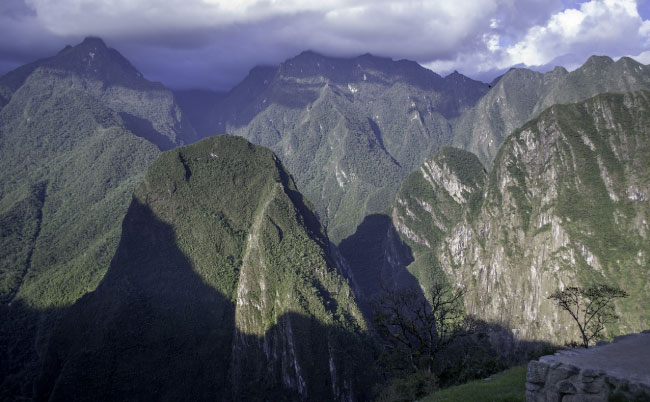
I tiptoed along the darkened path like an Indian, planting one foot in front of the other. I told my group to go ahead, as I had found my own pace and was reveling in a quiet space and the solitude of thought.
Traveling alone is a solitary flight, where one experiences her own definition of courage. Alone, the trip is not colored by a companion’s needs or wishes. You carry your own baggage. You sing your own song. You are free to define the world with your very own words.
And so, on this morning, making my way to this ancient Inca temple in the sky, I began the long task of defining myself: not as a courageous victim of my own neurology, battling the demons with my sword and hiking boots, but rather as a capable woman, who could look up the mountain and walk to the top.
Below me, somewhere in another place, my life awaited. My children awaited for my return—with safe and caring people in our house by the sea. My disease waited in dark empty rooms for slivers of light to unmask it.
The sun began to rise slowly, illuminating the once dark shadows of majestic mountaintops, mist rising from the peaks like white puffs of heaven floating home. Ahead of me…a set of Incan steps shooting straight up to the sky—the last and hardest stretch.
Beyond the staircase stood a temple bestowing a glorious view of Machu Picchu nestled in a mountain far below. Other hikers stood silently about: speechless, breathless at the sight. Tall, majestic mountains encircled the ruins, the thin air making it appear that you could touch a peak wrap it up and take it home.
Seeing that no one had begun to walk the final leg of the trail, I sped ahead to enjoy it alone. I delighted in the solitude, for even the silence seemed to reverberate from the mountaintops, the absence of sound a sound in itself. Light radiated from a clear blue sky, bouncing off the leaves and making patterns on the path. And always below me, I could see the peaks of Machu Picchu, jutting boldly toward the sky.
I arrived with staggering steps and climbed upon an old stone farming terrace that offered a plot of grass and a magnificent view of the world below. Warm tears found their way from my eyes as I whispered, “I am here, I am here!”
And in that moment, the sum of all the things I had ever been, found a world inside of me of all the things I might become.
No longer was I just a human being with imperfections and struggles or a single woman with MS. I was also a strong wind of potential, blowing quietly away from the land of never.
